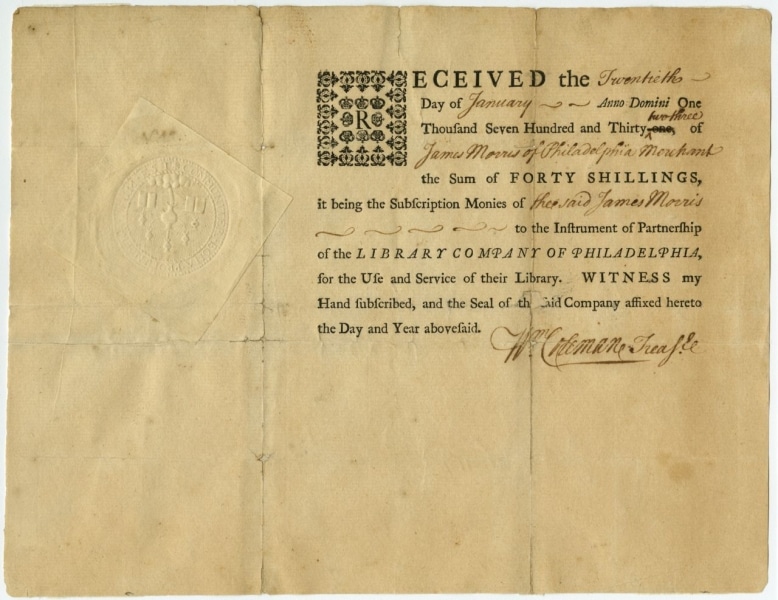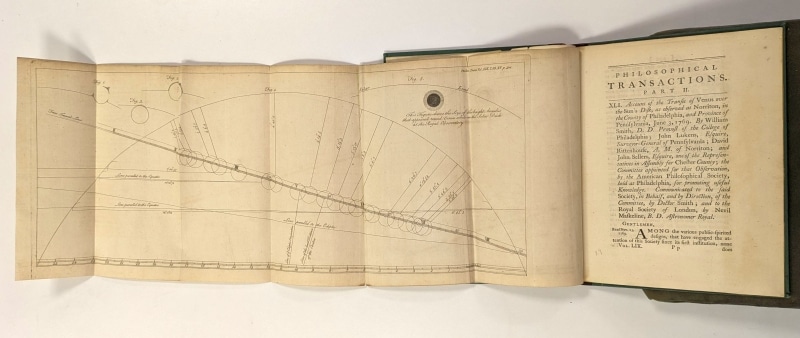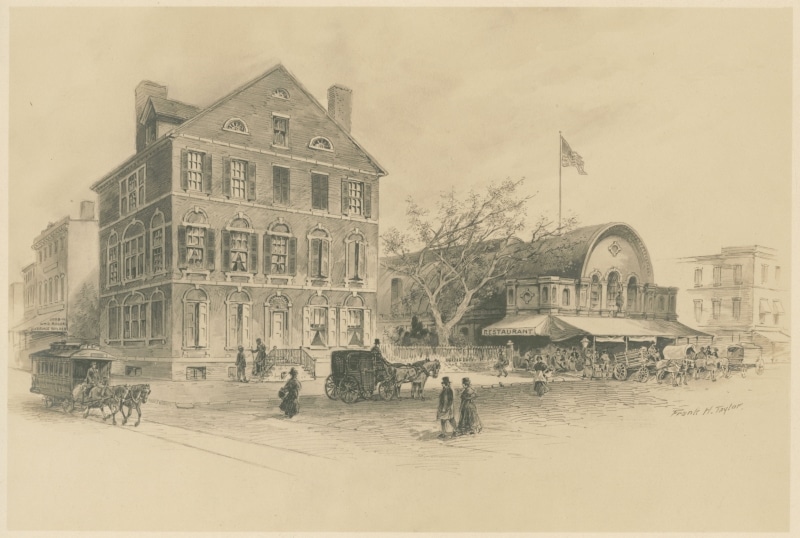Shareholder Spotlight: Sarah Lukens Keene (circa 1783-1866)
Dana Dorman, Archivist, Library Company Papers Project

Image: Receipt for a Library Company share, 1733.
We continue our monthly “Shareholder Spotlight” series by taking a closer look at share #496 and its first owner, Sarah Lukens Keene (circa 1783-1866).
Shareholders have always been the backbone of the Library Company of Philadelphia. Starting with the first group of fifty tradesmen who formed the library in 1731, shareholders have provided crucial financial support each year for our mission to “pour forth benefits for the common good.”
We keep careful track of who has owned each historic share, and our list of 9,800+ shareholders includes signers of the Declaration and Constitution, merchants, doctors, soldiers, scientists, artists, philanthropists, politicians, and much more.
Share #496
This share was first issued to John Lukens (1720-1789) likely in the spring of 1787. The date is listed as “not recorded” in Library Company share records, but based on the dates for the shares issued before and after share #496, Lukens likely became a shareholder between February 10 and May 29 of 1787.[i]
Lukens was a surveyor, government official, and scientist. He had been Surveyor General of Pennsylvania and Delaware from 1761 until 1776, when he was ordered to close Philadelphia’s land office. A few years later, in 1781, the Pennsylvania General Assembly elected Lukens to again serve as Surveyor General of Pennsylvania. He continued in that position until his death.[ii]
The 1785 Philadelphia directory lists Lukens as being based on Market Street, between 6th and 7th Streets. That location certainly would have been convenient to the Library Company’s rented space at Carpenter’s Hall.
Lukens was also a library supporter well before becoming a Library Company shareholder: he had helped found the Union Library Company of Hatborough three decades earlier in 1755. He had also been elected a member of the American Philosophical Society in 1767, and he served on its committee to prepare for the observation of the Transit of Venus along with William Smith, John Sellers and David Rittenhouse.[iii]

Image: The published account of Lukens’ and colleagues’ observations of the 1769 transit of Venus included a fold-out depiction of an earlier transit of Venus across the sun. William Smith, John Lukens, David Rittenhouse, John Sellers. Philosophical Transactions. Part II. XLI. Account of the Transit of Venus over the Sun’s Disk, as observed at Norriton, in the County of Philadelphia, and Province of Pennsylvania, June 3, 1769. (Philadelphia, 1769).
Smith’s account of that committee’s work observed, “few persons have a better judgment, a correcter [sic] eye, or have been more accustomed to view objects, both celestial and terrestrial, through telescopes, than Mr. Lukens.”[iv]
Unfortunately, Lukens formal relationship with the Library Company was short-lived. He lived only two more years after becoming a shareholder. But after his death in 1789, his estate continued to maintain the share for the next 19 years. This may have been in part due to the complexity of untangling Lukens’ large estate. Two of his three executors died, and the settlement faced legal challenges and other issues.[v]
Lukens’ surviving executor and son-in-law Major David Lenox (1754-1828) finally sold the Library Company share to his niece and Lukens’ granddaughter Sarah Lukens Keene (circa 1783-1866) on May 4, 1808.
After the deaths of her parents, Keene had been raised by her uncle David and aunt Tacy Lukens Lenox (d. 1834). She almost certainly joined the Lenoxes when David was appointed by President George Washington (1732-1799) as “Agent of the United States of America, to reside in the kingdom of Great Britain, pursuant to the act for the relief and protection of American seamen.”[vi]
But Keene had apparently returned to Philadelphia by November 1805, when Dolley Todd Madison (1768-1849) mentioned in a letter to her husband that “Mrs. Lenox and Miss Keen” had visited to invite her to a party.
Unfortunately, little is known of Keene’s involvement with the Library Company beyond owning her grandfather’s share.
Keene never married, but she was independently wealthy thanks to family inheritances, including from her grandfather and her uncle David and aunt Tacy. She lived in a large brick house on the northwest corner of 10th and Chestnut Streets in Philadelphia.[vii]

Image: Frank H. Taylor. The Keene Mansion and Franklin Market (Philadelphia, circa 1922).
Keene chose to leave at least some of her large estate solely for the benefit of other women. She included a provision in her will to create “an establishment for the reception and maintenance forever of five, six, or more aged gentlewomen (ladies) who are widows, or single women unmarried, of respectability, but decayed fortunes, and who have become destitute at an advanced age of the means of support.”[viii]
Unfortunately, according to a newspaper article more than 40 years after Keene’s death, this provision of her will was not fully enacted and “no one has ever occupied the home thus provided for indigent widows or single women.”[ix]
Most of the rest of Keene’s large estate went to her niece Ellen Keene Mitchell (d. 1905), great-granddaughter of the share’s first owner John Lukens.
Mitchell maintained the Library Company share in her aunt’s name for another sixteen years, but finally transferred the share from Keene’s estate to herself on March 4, 1882 and maintained it until her death in 1905.
The share has been owned by ten people total in its history.
Not yet a shareholder?
Share #496 is currently available. We work hard to match potential shareholders with historic shares that match their interests, and we would love to match you with Sarah Lukens Keene’s share or another option. To learn more, reach out to our Development Office at development@librarycompany.org.
—–
[i] The previous share, #495, was issued on February 10, 1787. The following share, #497, was issued on May 29, 1787. Therefore, Library Company staff estimate that share #496 was issued sometime between those two dates.
[ii] Finding aid for Lukens Family Papers (collection 161), University of Delaware Library Special Collections, https://findingaids.lib.udel.edu/repositories/2/resources/1560 (accessed September 10, 2024).
[iii] Whitfield J. Bell, “John Lukens (1720-1789),” in Patriot-improvers: Biographical Sketches of Members of the American Philosophical Society Volume One 1743-1768 (Philadelphia, 1997), 314-320.
[iv] William Smith, John Lukens, David Rittenhouse, John Sellers. Philosophical Transactions. Part II. XLI. Account of the Transit of Venus over the Sun’s Disk, as observed at Norriton, in the County of Philadelphia, and Province of Pennsylvania, June 3, 1769. (Philadelphia, 1769).
[v] Finding aid for Lukens-Lenox Papers (Manuscript Group 489), Pennsylvania State Archives, https://www.phmc.state.pa.us/bah/dam/mg/mg489.htm (accessed September 10, 2024).
[vi] Lenox’s role is described in the footnote of “To George Washington from David Lenox, 27 May 1789,” Founders Online, National Archives, https://founders.archives.gov/documents/Washington/05-02-02-0287 (accessed September 10, 2024).
[vii] Sarah Lukens Keene will in Pennsylvania, U.S., Wills and Probate Records, Wills of Philadelphia County, Vol 57-58, 1866. Courtesy of AncestryLibrary.com.
[viii] “The Will of the Late Sarah Lukens Keene – A Charitable Institution to be Founded,” The New York Times, June 17, 1866.
[ix] The newspaper article blamed the lack of occupants in part on the building’s “reputation of being haunted.” “Heirs Sue Bishop to Recover Estate,” The Philadelphia Inquirer, February 5, 1910.


